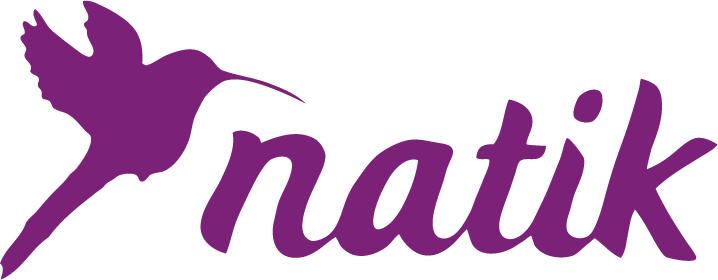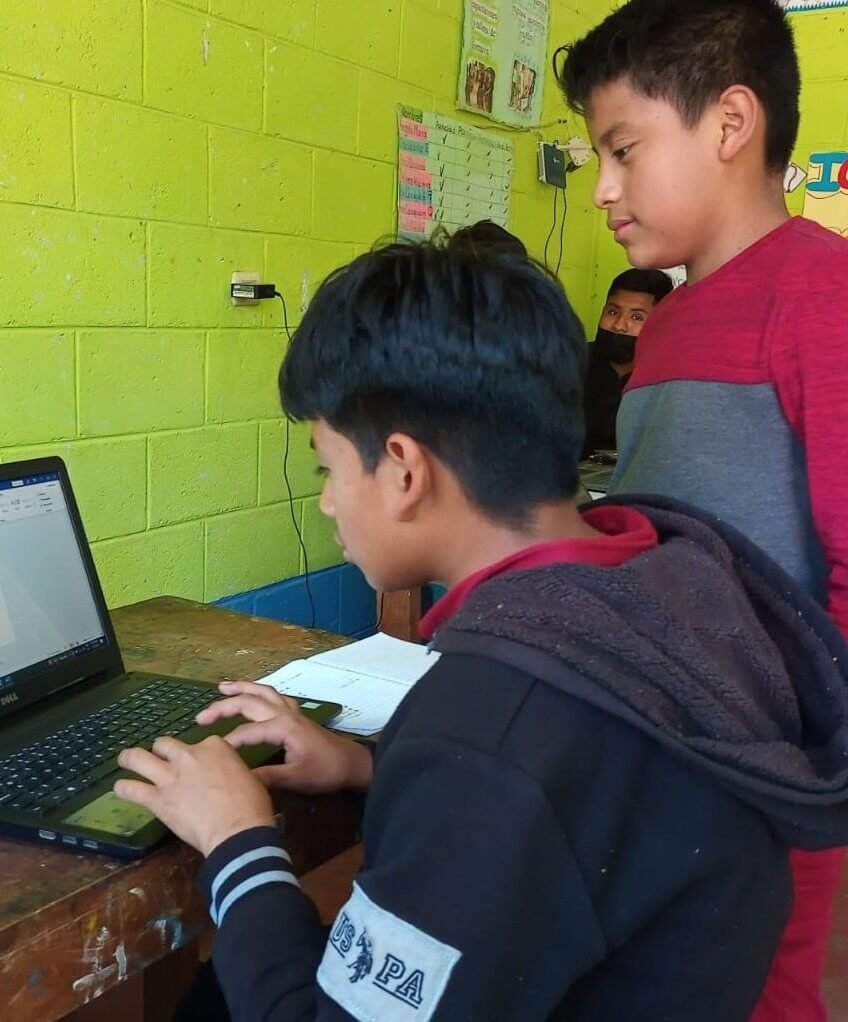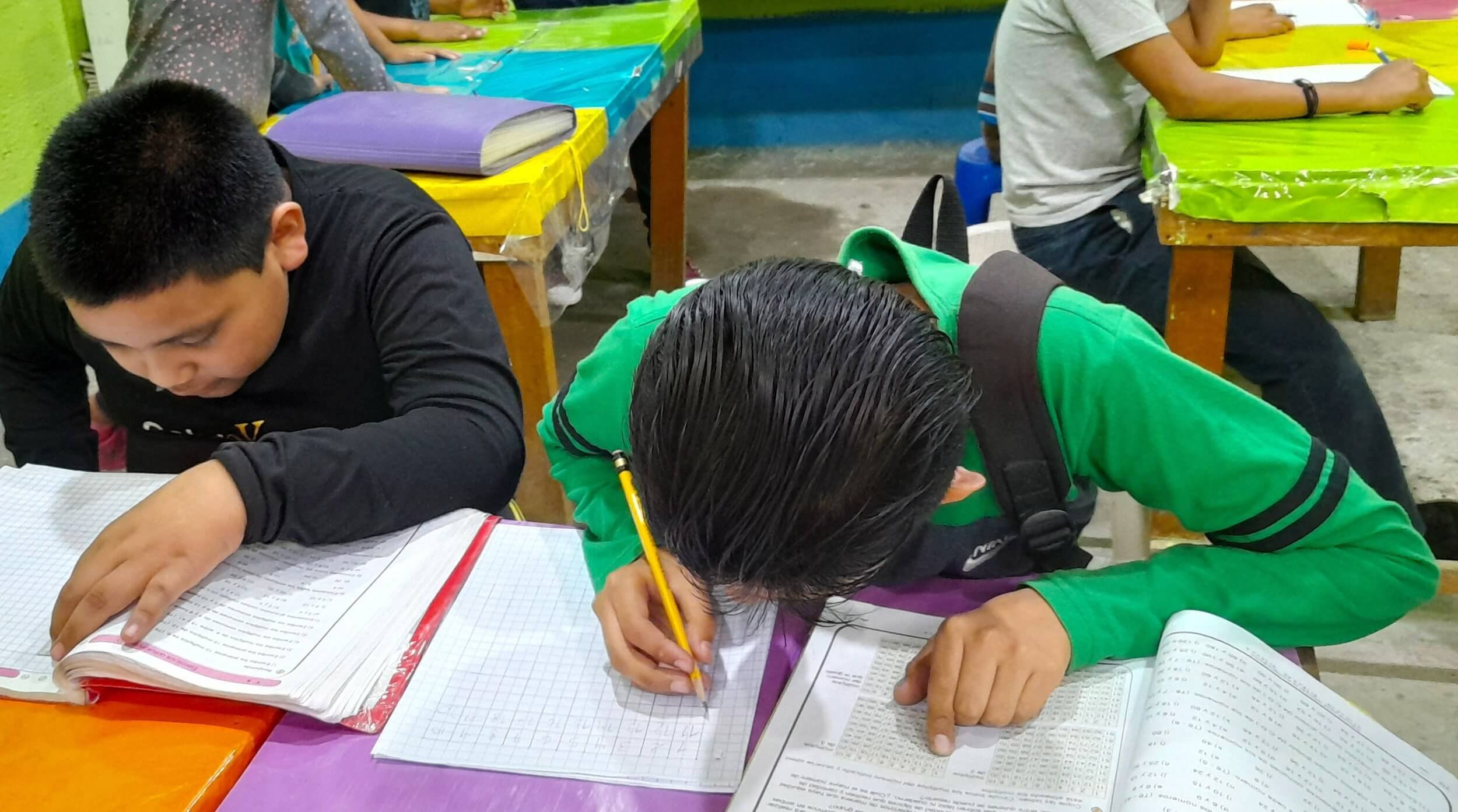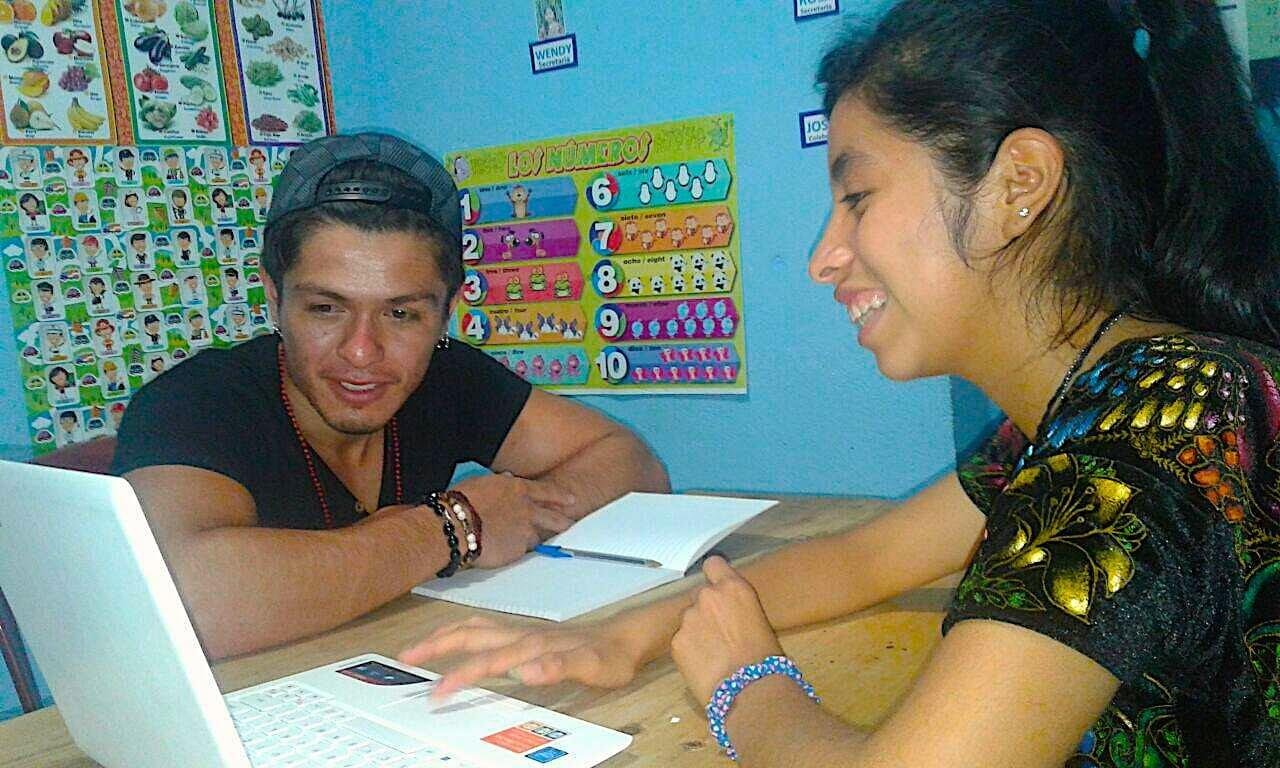Donate to Education
Educate children today for community impact tomorrow!
Education plays a central role in poverty levels in Mexico and Guatemala.
There is a strong correlation between quality education and poverty.
Family poverty results in less education for the children, which leads to continued poverty, thus creating a vicious cycle.
Children from poor families are more likely to drop out, repeat grades, or have poor academic performance.
What are the challenges
faced by poor indigenous communities
in Mexico and Guatemala
in accessing quality education?
There is a strong relationship between development and poverty. The cycles of poverty include two related types of poverty: regional poverty and inherited family poverty. Education, nourishment, health, housing, and modes of employment are interrelated factors that either diminish or contribute to poverty.
Keeping children in school as long as possible is the most expedient way of breaking the cycles of poverty. For individuals, every additional year of education could increase lifetime income by up to 10%. Adults with culturally relevant education invest their knowledge and skills into their communities, which is the most effective way to reduce regional poverty.
The U.N. 2030 Development Goal #4 states that a key factor to reducing poverty includes improving the quality and access to education, especially for children of disadvantaged groups like indigenous communities and rural populations.
The challenge is that there are many factors that contribute to educational inequities.
1. Language Barriers
Many indigenous children speak their native languages at home. When Spanish is the language of education, indigenous students can’t understand and fully engage in the learning process.
2. Cultural Relevance
Educational curriculum often lacks relevance to the lives and social context of indigenous communities, leading to disengagement from the educational process.
3. Discrimination and Marginalization
Indigenous students frequently encounter discrimination within the educational system, which can discourage attendance and participation.
4. Limited Access to Schools
Many indigenous communities are located in rural areas. The distances, scarcity of schools, and teacher burnout and turnover reinforce the choice of students to stay home and help their parents.
5. Quality of Education
Schools in rural and indigenous areas often operate with poorly trained teachers and inadequate educational resources, like books. Many teachers (sometimes students themselves) attend overcrowded classrooms of undernourished and exhausted children.
6. Economic Barriers
Many families can’t afford to send their children to school, so they work instead of going to school. Agricultural labor is the main type of work, followed by street vending, artisan piece work, and city-based industry.
7. Gender Inequality and human trafficking
Indigenous girls are particularly vulnerable due to gender roles that prioritize domestic responsibilities over schooling. In addition, parents of girls are frequently approached with offers of employment as domestic workers in distant cities, with the promise of a safe home and education for their daughters. The reality is that many of those girls end up being forced into prostitution and never see their families again.
CONTRIBUTE TO BREAKING THE CYCLES OF POVERTY
How to confront low levels of education and high levels of poverty in Guatemala and Mexico?
Addressing these challenges requires a multifaceted approach that includes bilingual education initiatives, culturally relevant curricula, improved infrastructure, and targeted support for indigenous students and families.
To this end, Natik supports grassroots scholarship and afterschool enrichment programs as a long-term investment in future leaders. The afterschool programs are a cost-effective way to help many children with limited resources. As many as 5 children share each computer for homework and computer literacy classes. Competition for the scholarships continues to increase as more students and their families apply for scholarships.
The students are selected based on socio-economic need, academic excellence, and teacher recommendations. Once they are accepted into the programs, the scholars must maintain their academic excellence and participate in extracurricular leadership and community activities organized by their programs.
Our Partners
Our partners invest in structure, team competencies, management systems, enabling policies, knowledge and learning, and leadership.
Their actions contribute to accomplishing their self-determined goals to transform their communities through education, health, and sustainable livelihoods.
The most powerful proof of education's impact is that all of Natik’s partner organization leaders completed their studies thanks to scholarships.
Their families couldn’t have afforded it otherwise. These leaders are in a unique position to guide students through challenges they personally overcame. This is a priceless gift to the children, their families, and the community.
ANADESA
Asociación del Nuevo Amanecer, Santiago Atitlán
ANADESA, based in Santiago Atitlán, Guatemala, targets sustainable community development through education, leadership, and economic development programs for children, youth, and women.
Their goal is to build capacity in the local community through formal educational support for youth and practical education for adults enabling them to achieve self-sufficiency and lead healthy, happy, enriching, and fulfilling lives.
The Education Program supports children and adolescents in elementary and middle school through after-school programs that include help with schoolwork, homework assignments, and computer literacy. If the children need materials for homework projects, the program provides the materials at no cost. The program also offers art, music, and recreation, as well as workshops in non-violence, hygiene, and environmental awareness as alternative activities to the temptations of drug addiction and violence in the community.
AN ANADESA TEAM MEMBER’S EDUCATION
I studied clinical psychology because its purpose is the comprehensive well-being of people, which contributes to a more conscious and resilient society. Through my work with ANADESA I’ve learned to be empathetic to the realities of the participants, because despite being from the same town, the situations we experienced are different and we face them according to our resources and that makes the lessons greater.
Jessica
What your donation can accomplish:
$383 = 1 printer
$256 = 1 filing cabinet
$186 = 1 staff desk
$45 = 3 books for the library
$26 = 1 student chair
2023 RESULTS: EDUCATIONAL PROGRAMS
12 girls and boys were promoted to sixth grade and 12 adolescents promoted to ninth
106 children and adolescents received after school programming
91% passed their school year
74% youth received leadership program certificates
75 families participated in educational workshops
1 after school learning center installation was improved
Pueblo a Pueblo
Pueblo a Pueblo - Santiago, Atitlán, Guatemala
Pueblo a Pueblo provides scholarships, operates a youth entrepreneurial leadership program, and supports and educates women on nutrition and wellbeing during pregnancy. The agricultural and beekeeping projects teach skills that provide nutrition and locally-based income for families.
Pueblo a Pueblo knows that parents who earn dignified, sustainable incomes are eager for their children to stay in school as long as possible.
Their scholarship programs provide children with the support they need to attend and succeed in school and to stay healthy through regular medical and dental exams.
PaP collaborates with community members to develop local solutions that build individual and community capacities and contribute to a future that includes health, education, and sustainable incomes.
PUEBLO A PUEBLO SCHOLARSHIP RECIPIENT
Learning is good because through new knowledge I can create new things and be able to generate my own income in the future and help my family. My mother encourages me, my father accompanies me to and from school, and my brother helps me with my homework. I’m studying Digital Accounting. At first I wanted to pursue a career in nursing, but now I really like working with numbers.
-Heidy
What your donation can accomplish:
$1,464 = 1 year university scholarship
$1000 = 1 year high school scholarship
$720 = 1 year middle school scholarship
$672 = 1 year primary school scholarship
$100 = Partial scholarship support
$45 = 3 books for the reading circle
2023 RESULTS: EDUCATIONAL PROGRAMS
42 scholarship students completed their school year
18 students used local health services
15 basic school packages of tennis shoes, backpacks, and school supplies were distributed
8 youth participants in entrepreneurial funded projects
87% participants generated income from their projects
19 health and nutrition workshops were held
Ruk’ux Scholarship Program
Ruk’ux - Santiago Atitlán, Guatemala
Ruk’ux has been providing scholarships in Santiago Atitlán, Sololá, Guatemala since 2007. Every year, ten exceptional students receive scholarships and academic tutoring. They also benefit from mentoring in reading and writing.
Older students tutor the younger students, creating a community of mutual support. Most are the first in their families to attain higher levels of education, which comes with a very particular set of social challenges.
Ruk’ux Scholars are encouraged to think of themselves as ‘agents of change’ within their families and communities. The students are exposed to a wide variety of extracurricular experiences, including conceiving and managing income-generating ventures that can help subsidize university studies and contribute to supporting their families after graduation.
These are valuable lessons for students who live in economically depressed regions and come from homes where the primary sources of income are subsistence manual labor.
What your donation can accomplish:
$1000 = 1 year university scholarship
$500 = 6 months scholarship
$100 = contribute toward shared computer
$85 = 1 month scholarship
$45 = 3 books for the reading circle
What I like best about Ruk’ux is that we find ways to generate funds for the program, because that helps us have a little more income, which helps to cover academic expenses. I also like the activities where we all support each other as a team and talk about our projects and together we motivate ourselves.
Francisca Verónica, University Scholarship Recipient
2023 RESULTS: EDUCATIONAL PROGRAMS
240 afterschool sessions in tutoring and leadership
10 scholarship students continued their studies
1 student graduated in Business Administration
2 computers purchased for homework and project work
1 camera purchased for photography project
48 beaded hummingbirds sold
2 students were taught Tz'utujil
1 children’s reading circle was implemented
1 campaign to collect and distribute food to low-income families completed
Yo’onik Learning Center
Yo’onik - Zinacantán, Chiapas, Mexico
The Yo’onik scholarship and tutoring program helps improve students' grades at school and develops important social and leadership skills. Yo’onik integrates the local traditional culture into their educational program and motivates children and adolescents to continue their studies.
In the Yo’onik learning Center, everyone teaches and everyone learns. Yo’onik identifies extraordinary students and helps them offset the additional expenses of studying beyond primary school. The study stipends also assist families in compensating for the loss of income that occurs when a child doesn't leave school to work.
These exceptional youth learn valuable leadership skills through the training and supervision involved in helping tutor younger children in their mother tongue of Maya Tsotsil. As a result, the younger students receive cultural affirmation, while the older students develop essential organizational, administrative, and creative teaching skills.
The children and the adolescent scholarship recipients cultivate vegetable gardens, learn about recycling, and participate in reforestation efforts.
What your donation can accomplish:
$800 = 1 year university scholarship (Mexico has more options)
$600 = 1 year high school scholarship
$500 = 1 year middle school
$100 = 1 month university + coordinator
$45 = 3 books for the library
YO’ONIK SCHOLARSHIP RECIPIENT
I’m studying Chemical Engineering, due to my interest in learning about the chemical processes carried out in the production of different products, as well as researching the environmental impact they produce. At some point I will dedicate myself to investigating water sources and wastewater treatment, to help small towns and villages without water systems.
Susana
2023 RESULTS: EDUCATIONAL PROGRAMS
192 after school sessions for children and adolescents were held
30 students attend the weekly after school sessions regularly
30 students receive healthy snacks weekly
6 scholarship students continued their studies
6 scholarship students tutored children
5 new computers purchased for homework and tutoring sessions
La Puerta Abierta Literacy Program
The LPA Literacy - Santiago Atitlán, Guatemala
The Puerta Abierta Library Literacy Program in Santiago Atitlán, Sololá, Guatemala, reaches children, youth, grandparents, and families through multi-faceted projects. The Open Books Program, Reading Circles, Mobile Library, and Teacher Training Programs expand literacy in the community while exploring diverse themes that foster leadership, critical thinking, empathy, and inclusion.
Books are scarce in Santiago Atitlán, Guatemala, and the opportunity to learn to read or be read to is rare. Many schools and most homes have no books at all. The Puerta Abierta Library books are shared through open story hours, both in-person and online, and lent to families for home reading.
Public schools have many needs, but donating to public education in Guatemala would be complicated.
Instead of giving money, the Puerta Abierta traveling librarians multiply their impact by giving their skills, knowledge and talent to teachers and students of public schools. During classroom visits, the librarians model creative teaching techniques for teachers by reading out loud, coordinating a thematically related art project, facilitating individual reading, and leading light-hearted interactive singing with the students and teachers.
Teens participate in book clubs by reading and talking about a featured books that are carefully chosen by the librarians to include a variety of complex social, cultural, moral, spiritual, and political issues that invite thoughtful sharing.
The Open Books program teaches literacy curriculum to teachers from schools, organizations, and libraries working with children and adolescents throughout Guatemala.
LA PUERTA ABIERTA LIBRARIAN
The Puerta Abierta has had great importance in my life. It’s contributed to my professional development. Being a musician, I was able to merge my musical talent with reading. One of the parts I like the most about my job is being able to combine music with storytelling for the students.
- Pedro
2023 RESULTS: EDUCATIONAL PROGRAMS
68 hours of workshops funded by Natik through the The Open Books Program, Reading Circles, Mobile Library, and Teacher Training Programs
What your donation can accomplish:
$1000 = 65 books for reading circles
$300 = 1 teacher training workshop
$120 = 1 month of school literacy program
$45 = 3 books for the library
Vicky’s story….
In 2011, Vicky was the first scholarship student and the first mentor of younger students in the Yo’onik Community Learning Center in Zinacantán.
She loved math and wanted to continue studying.
Program leaders asked her to help the children who showed up every Saturday. Since then, a building was built to house the program and Vicky is now completing her third year in a university program that prepares youth for leadership roles in indigenous community organizations.
Donate to education for children
By donating to Natik’s Education Fund, you will be supporting families who cannot afford for their children to stay in school without outside financial support.
Your donation will impact the lives of the youth, their families, and the future of their communities.
Donations are tax deductible
Natik is a 501(c)3 nonprofit organization registered in the United States, so donors will receive acknowledgement of tax exemption in the U.S. at the time of donating.
Natik has exceptionally strong working relationships with our partner organizations that go beyond the IRS requirements for a granting organization.


































